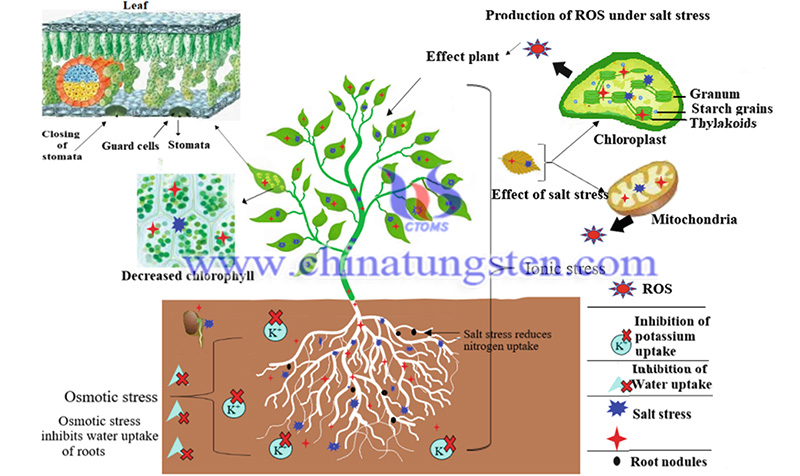Molybdenum Sulfur Crystals Ensure Plants Growth on Saline Soil
- Details
- Category: Tungsten's News
- Published on Tuesday, 06 April 2021 23:39
The new molybdenum sulfur (Mo-S) micro-nano crystals formed by molybdenum salt and cysteine in plant cells ensure the plants growth on saline soils. Solonchak is a kind of soil with high soluble salts, which affects the growth of surface crops, threatens food security, and aggravates the degradation of the ecological environment. The research team of Professor Xiangang Hu of Nankai University proposed a research strategy of low-cost, low environmental risk, and high environmental value to replace traditional nano-materials, solving the problem of harsh growth of plants on solonchak.
According to reports, saline soils are distributed in more than 30 countries on six continents, with a total global area of about 1 billion hectares. The improvement of solonchak through comprehensive measures such as irrigation and drainage, biology, and farming have a long cycle, high cost, and various uncertain factors. Artificial nanomaterials have shown great potential in agricultural production and agricultural environmental protection, but their practical application and side effects have always attracted attention.
"In addition to the high cost of artificial nanomaterials, they also generate environmental health risks and uncertainties in environmental applications due to their properties or environmental transformations." Professor Hu Xiangang said.

In the study, the research team sprayed molybdenum salt and cysteine on the leaves of plants. Glutathione and phytochelatin were reduced through reduction, similar to the method of preparing a cocktail, so that molybdenum salt and cysteine were formed in plant cells. Molybdenum sulfur micro-nano crystals. On high-salt soil, the leaves of crops without crystals show obvious signs of yellowing and withering, while crops with crystals could grow normally.
To reveal the mechanism leading to these differences, the researchers compared gene expression and metabolites in leaves with and without crystals, and found that the crystals in the leaves can promote Ca2+ signal transduction and promote the elimination of harmful free radicals when stimulated by high salt, triggering a series of self-protection measures and improves the ‘immunity’.
Exogenous ions self-assemble in plant cells form crystals with high biocompatibility, driving plants grow in high-salt soils. Compared with the previous artificially synthesized molybdenum disulfide nanomaterials, the self-assembled Mo-S crystals of plant cells not only have few toxicities, but also protect plant development under unfavorable soil conditions. It provides a strategy for solving from the source, for crops to grow on saline soil, and for expanding plantable soil, ensuring agricultural planting, and providing a new method worth exploring for agricultural food production.
The results were published online in American Chemical Society Nano. Xiangang Hu saline soils with different distribution areas, such as the inland of Northwest my country, the upper and middle reaches of the Yellow River, the arid and semi-arid depressions of the Huanghuaihai Plain, the semi-humid and semi-arid low-lying areas of the Northeast, and the coastal semi-humid areas. Whether molybdenum sulfur micro-nano crystals could be formed through molecular and ion self-assembly to ensure the plants growth on solonchak is worthy of reference for ecological environment protection and agricultural production.
| Molybdenum Supplier: Chinatungsten Online www.molybdenum.com.cn | Tel.: 86 592 5129696; Fax: 86 592 5129797;Email:sales@chinatungsten.com |
| Tungsten News & Prices, 3G Version: http://3g.chinatungsten.com | Molybdenum News & Molybdenum Price: http://news.molybdenum.com.cn |



 sales@chinatungsten.com
sales@chinatungsten.com